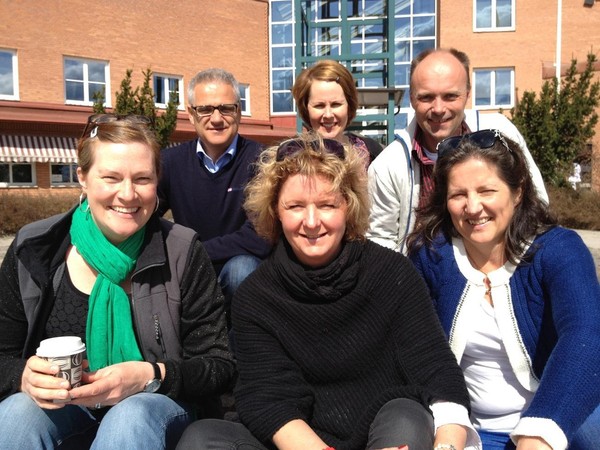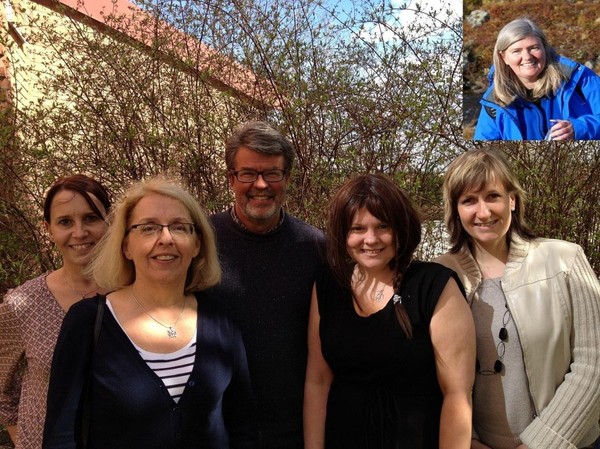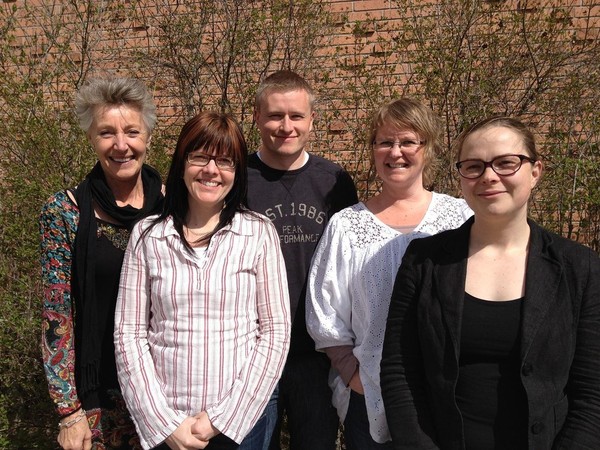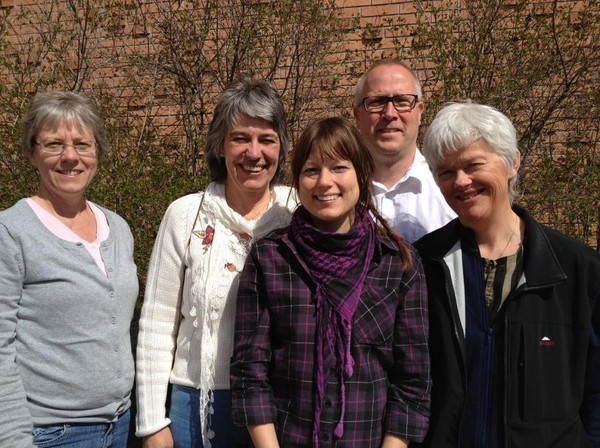HÄRJEDALENS KOMMUN
Härjedalens Gymnasium, Sveg, Sweden
Härjedalens Gymnasiums Inter-Disciplinary Project on Sustainable Development
General Background
During the fall term of 2011 we carried out a four-week inter-disciplinary project on sustainable development with our first year students (16 year olds) in the social and natural science programs at Härjedalens Gymnasium.
In the Swedish upper secondary school curriculum it is mandatory to work with sustainable development and working in inter-disciplinary projects is promoted. For four-weeks the students worked in groups with the project, using the time scheduled for the participating subjects. For the students attending the Natural Sciences Programme the participating subjects were Social sciences, Biology and Swedish. For the students at the Social Sciences Programme, the participating subjects were Social sciences, Natural Science and Swedish. All of the participating subjects have contents as well as general and diploma goals that fit the contents of the project. The students present their work in a short academic report as well as in an exhibit in the school. The exhibit took place for two hours and the whole school was invited, the students had created exhibits and interactive exercises. In this way, the information learned by the students and the work with sustainable development could be spread to and include the whole school (general staff and teachers as well as students). The exhibition therefore is a very important and also very appreciated part, that it was appreciated was, to mention an example, noticed in the way that several people in the general staff asked the students for copies of parts of the information they’d displayed in the exhibit. The students projects were on the following subjects: toxic chemicals that we have used and their effect on the environment; dangerous chemicals in cosmetics and bodily care products; Swedish meat being fed soy products which leads to the depletion of the rainforest; the food served for school lunch; healthy and unhealthy foods, products (including tobacco and alcohol) and exercise/the lack of and the effects on our health; the local recycling and waste plant; earth ships and other self-sufficient solar powered houses; problems with water including conflicts connected to scarcity thereof, Food – the unequal dividing of recourses in the world. The project description for the inter-disciplinary project on sustainable development, as presented to the students, is attached.
To live sustainably in Sveg, Sweden and the world
The purpose of this work is to build a sustainable:
• Sveg, ie. a future Sveg
• Sweden and the world
To discover and demonstrate that Sveg is dependent on the rest of the world and vice versa, in other words: a sustainable future in the world depends on a sustainable future in Sveg and vice versa.
All groups must investigate a problem area based on the following model:
1. Status
Determine and describe how the situation is today (give factual information, describe the problem and the negative consequences it gives) Search Facts (online, in books, contact any / any organization / agency / company / other).
2.Goals and actions
Describes what YOU yourself, we in Sweden and the world can do to reduce the negative consequences of the problem. All three aspects should be included in your report. Include any agreements made in Sweden and the world to solve the problem. Discuss solutions
3. Attendance
Come to the classroom for attendance registration at all sessions, unless otherwise stipulated in advance.
Examination
The work will be presented orally in an exhibition at the cafeteria, and written in a report. The project will be graded separately for each participating subject, according to the criteria’s of the course in the subject (i.e. Social sciences, Swedish, Biology or Natural science).
Instructions
It is important to use the time allocated for the work. If the time in school is not enough to complete the project, the rest of the work is to be done as homework. All team members must participate and contribute with work.
It is important that you can find reliable sources, and that you account for them properly. You also need to plan your work and distribute certain tasks. All of the group must master the entire group.
The rating depends on how precisely and completely you manage to illuminate and account for your area.
In three separate booklets, we have collected: suggestions for topics and subjects to choose, a more detailed task instruction, a more detailed description of goals and grading criteria for each subject. See these for more information.
Suggested topics, search tips and motivation of working form
Justification of work form: Portions of Education's stated program goals
For all three program goals (social science, technical and natural science) is a requirement for students to get a good ability to use computers as tools, and to use information technology for learning and communication. The environmental and resource issues are to be advanced knowledge to be an important part of education.
Suggested themes and topics:
1. Food
2. Water
3. Recycling, Waste Disposal
4. Environmental Politics, Propaganda, Overconsumption, Justice North-South
5. Chemicals, Artificial materials
6. Housing, Energy, Transportation
Each topic has suggestions of topics to choose from, of course it’s possible to choose a different topic connected to the theme, after consulting with the teachers. See below for suggestions and inspiration.
1. Food
Coffee
Meat / Soy, for example, cutting down rainforests for cattle breeding; genetically modified foods.
Can Härjedalen / Sveg become self-sufficient
Problems with modern large-scale agriculture vs. small-scale
School food, where is it from and how is it produced?
Alternative forms of cultivation: ex. Permaculture
U.S. meat industry
Diet and health - consequences of the modern lifestyle
2. Water
Water: Drinking Water / sanitary water
Water - water quality
Access to clean water in different parts of the world, spreading disease and high mortality among children due to lack of clean water. Conflicts. How can you solve the problem.
3. Recycling, Waste Disposal
Garbage items. Recycling/ treatment plants, refuse dumps.
Islands of plastic floating around in the sea.
Packaging options
Recycling of electronic scrap, ships, etc. in Developing countries from developed countries
Appliances / Electronics that are not made to be durable, but to break so we're buying new, (profit rules over long term sustainability).
4. Environmental Politics, Propaganda, Overconsumption, Justice North-South
The EU's agricultural subsidies, negative consequences for small-scale agriculture and countries in Africa / Asia.
Conflicts related to resource allocation example water / food.
Propaganda to consume more. The media propagate the wear-and-throw culture, fashion, trends, interior design / housing, everything is based on to consume more, and again ...
Ethics / Justice - allocation of resources, today: North consuming, South produces and receive trash / debris, and most affected by climate change.
5. Chemicals, Artificial materials
Plasticizers in place, adverse effects on humans, feeding bottles, toys etc.
Hygiene / Cosmetics such as: parabens ....
Historic, but still relevant (learning?). Chemicals we thought were safe. Example: DDT, PCBs, asbestos ...
Antibiotic resistance ...
Alternative natural / eco-friendly materials
6. Housing, Energy, Transportation
House / accommodation: Ex. find out more about solar-powered self-sufficient ground shipping (there is one in Show, including the U.S.), passive / material / villa / apartment block.
How can we save energy in households?:
Problems with fossil fuels and other energy sources (hydropower,
nuclear + / -), opportunities / obstacles different renewable energy sources such as solar,
wind, wave, tidal, geothermal energy, osmotic power plant(Norway).
This shall be included in your report:
1.) Describe the problem / question, how does it look in Sveg / Sweden and how it looks in the world.
2nd) What is the problem today (in Sveg / Sweden and the world)? Describe what is done and any proposed / desired actions.
3.) What else could be done? Suggest and discuss about possible solutions / actions. To suggest measures / solutions that you can do yourself (individual level), family (group level), school / Sveg, Sweden and the world (different levels).
Remember that it is important that you show how what we do in Sveg / Sweden is related to what is happening / has consequences / solutions in the world (and vice versa). It must be
evident that the use of a product in Sveg / Sweden, has consequences elsewhere in the world.
That is to say:
We have a globe with a limited amount of resources and a certain amount of renewable resources, which can be destroyed if we use them too hard or incorrectly. To satisfy all the world people's needs, we need to share these resources, if someone takes more to get someone else less. Destroy our renewable resource bases or ends the finite resources we have reduced the amount of available resources in the future. This has implications for us in the future and future generations.
We only have one earth to share, we can use it in a sustainable way, or use up as much resources as we can, as quickly as possible and thus do away with finite resources and destroy renewable resources. It is your and our choice, how we want the future to look like. We can still choose! You can select and actively influence (inform / engage / act) friends, family, school, Sveg, Sweden, World!
Instructions for folding wall exhibition
In your Foldables presentation to the problem, what is being done about it and propose solutions / measures to be included in any way. But you can choose how you want to present your question, and which of these parts you want to emphasize.
Think creatively. If you have worked with palm oil, you can eg mount various items containing this and gather data / images around those who take up the problem, measure and propose solutions. Remember to make the exhibition interesting and attractive, making people curious so they go back and read / look at pictures and learn more.
Remember, foldable exhibition will attract the people, try to awaken people's interest / curiosity, was creative in your presentation of your problem. If somebody wants to know more they can read about it in your report.
Administrative documents objectives and grading criteria
Purpose of Project:
To offer students a chance to context, and depression when the study is included in all relevant substances curricula. An opportunity to meet the curriculum guidelines that: "Education shall be conducted in working methods and develop students' ability and willingness to take personal responsibility and actively participate in society" and "Teaching should shed light on how society and our way of life and can be adapted to create sustainable development ". (See the relevant policy documents for more examples of goal achievement).
Policy documents that are relevant to the project:
Overall - Curriculum for the compulsory schools (Lpf94)
Program-- Degree for each program Gy2011
By Subject - Subject Plans for each subject Gy2011
By Course - Syllabus for each course Gy2011
Grading criteria for each course Gy2011
Excerpts from the curriculum for the compulsory schools (Lpf94)
All who work in schools should:
Communicating knowledge of fundamental democratic values. Teaching
shall be conducted in working methods and develop pupils' ability and
willingness to take personal responsibility and actively participate in society.
Teaching should shed light on how society functions andthe way we live and work can be adapted to create sustainable development.
Environmental perspective in teaching should provide students with insights so that they can both themselves help to prevent negative environmental impact, but also develop a person-
depth approach to the comprehensive and global environmental issues.
An international perspective is important in order to see the own reality in a global context, to create an international sound mentality and to prepare students for a society with more frequent contacts across national and cultural boundaries.
Pupils will:
Show respect and concern for both neighbourhood environment in a broader
perspective.
Promote solidarity with the disadvantaged groups both inside and outside our country.
Excerpts from the topic plans Gy2011:
Biology
The course will provide knowledge about:
Protection against earth's ecosystems by ecology.
Knowledge of the land and life of the soil and on biogeochemical cycles in soil, water
and air.
Knowledge of biological diversity, endangered species and gene banks.
Social Sciences
The course will provide knowledge about:
Understanding the issues of labor, resources and sustainable development.
Issues relating to power, democracy, equality and human rights
States including children and young people under the Convention
Rights of the Child.
International law, possibilities and difficulties in securing both by state
that the rights and safety. Basic international convention on human rights and freedoms of the various players the opportunity to application.
Democracy and human rights both the individual as the carbon
collective rights, how they relate to the state and the individual and how to out-
require their individual and collective human rights.
Economics, for example, financial structures and flows in Sweden
and internationally. Supply, growth and employment, resource use and
resource allocation based on various conditions.
Consumption in relation to the needs and resources.
Globalization and its impact on the basis of a democratic, economic and political perspective as well as for individuals, groups and nations. Analysis of challenges
that individual, nation and world are facing challenges to environmental and resource
distribution.
Natural science
The course will provide knowledge about:
Environmental and climate, earth resources, recycling, health, genmodification and how these issues can be handled by a science-Ratio
of action. By discussing and exploring issues of social ties
students should be able to consolidate, deepen and develop the science
knowledge to meet, understand and manage their time.
Of science's role in current affairs and in relation to sustainable
development, energy, climate and ecosystem impacts, ecosystem services, resource
use and ecosystem viability.
Various aspects of sustainable development, for example the case of consumption dividing of resources, human rights and gender equality.
The international economic and trade impact on countries' welfare and
Environmental and resource allocation. Globalisation's impact on individuals, groups
and societies.




